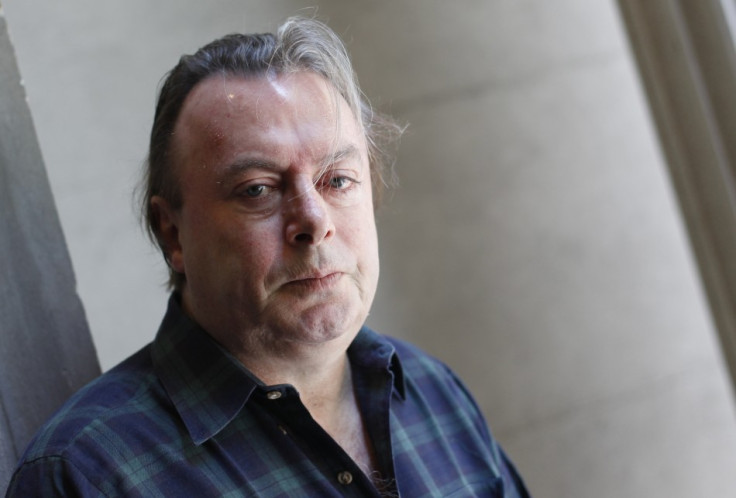Christopher Hitchens' Death: He Was A Writer, Not A Fighter

"The old men shall betake themselves to the public squares in order to arouse the courage of the warriors and preach hatred of kings and the unity of the Republic." 1793 Proclamation of the French Revolutionary Levee en Masse
The death of Christopher Hitchens is a cause of great sadness not only to his family but to a great many people, myself included, who have enjoyed and admired his writing and, perhaps even more so, his speaking.
One word that keeps being used about the late Christopher Hitchens is that he was a "fighter" who had "courage". The Telegraph's Tom Chivers even went so far as to describe him as an "atheist in a foxhole".
That last statement, a reference to the idiotic and untrue claim that "there are no atheists in foxholes," is perhaps the most exaggerated claim about the bravery of Christopher Hitchens.
It is clear that Hitchens did have reserves of real courage, as is proven by his reporting from war zones and by his travels to some of the most dangerous and oppressive countries on earth, notably to all three nations named by George W. Bush as belonging to the "Axis of Evil".
Hitchens once recounted how while visiting Vaclav Havel in Communist-era Prague he was slammed against a wall by secret police and arrested without being told what the charge was. He also faced arrest by the perhaps less fearsome British police when taking part in demonstrations against the Vietnam War in his youth.
Voluntarily undergoing the process of being waterboarded would also indicate that he was no coward. Certainly I don't think I would volunteer for it, and neither would most of those who have defended the practice.
Clearly, then, he was not a man content to allow his belief to remain just a theory, and from time to time he shared in the sufferings, or at least witnessed the sufferings, of those with whom he wanted to show solidarity in the face of tyranny, be they Czech dissidents, Iraqi Kurds or Kosovars.
But to describe him as a "fighter" or as someone who has occupied a foxhole is to fall victim to the exaggeration that even Hitchens was not immune from on occasion.
Although sometimes in his masterful debating style he would eloquently declare that he would "fight all the way" the evils of totalitarianism, he was also able to recognise that ultimately it was not he who did the real fighting for his beliefs.
Once while declaring his support on C-SPAN for military intervention in the Balkans in the early '90's he was asked mockingly by a caller to reform the Abraham Lincoln Brigade [American volunteers in the Spanish Civil War] and fight himself.
His response was one that recognised the limitations of his own combat abilities and courage: "It will sound absurd coming from a pudgy person in his mid-40s such as myself, but I very much admire those who have gone to volunteer their services in Bosnia, of whom there are some thousands now, and I wish there were more of them and I wish I had the nerve to do it myself."
More recently when asked about his taking of American citizenship after years of being a "legal alien" Hitchens said that part of the reason was that if it ever in some far off day came to it, he could in theory be called up and asked to wield a rifle himself in defence of what became his homeland. He said this while admitting that such a course of events was unlikely to unfold.
Hitchens clearly saw that he was not a "fighter" in the War on Terror or any other war, but saw that he took the role of the "old man" who "takes to the public squares in order to arouse the courage of the warriors and preach hatred of kings and the unity of the Republic".
The public squares may have taken the form of Vanity Fair, Slate, YouTube, TV chat shows, books and university campuses, and while describing a man who died at 62 and had an apparent love of life as "old" may seem a little out, nonetheless the role seemed to fit Hitchens perfectly.
This role was brought all too close to Hitchens when he found that one of the U.S. soldiers killed in Iraq, 2nd Lt. Mark Daily, volunteered at least in part as a result of reading his writings in favour of the war that began in 2003 and is only now coming to an end.
No more need be said of that, but readers could do worse than read Hitchens' account of his discovering this and his subsequent relationship with the Daily family, found here.
Christopher Hitchens was an excellent writer and speaker who also had his flaws like everyone else. He also had real courage, but I can't help but think that could he see what was being written about him today he would be both greatly moved but also modest about his reputation as a "fighter". He was well aware of who it was who did the real fighting for the civilisation and democracy he sought to protect and promote.
Whether he was a "fighter" or not, though, he will be greatly missed.
© Copyright IBTimes 2025. All rights reserved.






















